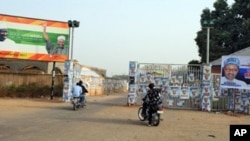Election observers are arriving in Nigeria to monitor three weeks of voting for new lawmakers, governors, and a president for Africa's most populous nation. Human Rights Watch says those candidates have not spent enough time addressing issues of communal violence and corruption.
Human Rights Watch says those elected must address what it calls Nigeria's profound human rights challenges: communal violence, abuses by government security forces, endemic corruption, violence in the Niger Delta, pervasive election-related abuses, and a culture of impunity for all manner of human rights violations.
"Nigerian security forces have a long history of carrying out abuses against Nigerian citizens, particularly members of the Nigerian police force have been implicated in extra-judicial killings, torture, and other forms of ill treatment whether it be individuals who are in police custody or ordinary citizens," said Eric Guttschuss, a researcher on Nigeria for Human Rights Watch. "The problem is that again members of the security forces who commit these abuses are rarely held accountable."
Election observers say they will be watching for signs of violence between Muslims and Christians in northern Nigeria, especially as incumbent President Goodluck Jonathan is from the predominantly Christian south and his main challenger, former military leader Muhammadu Buhari, is from the mainly-Muslim north.
The risk is especially high in Plateau state, where Guttschuss says more than 1,000 people were killed in communal violence over the last year.
"Unfortunately, the Nigerian authorities have failed to break the cycle of violence by holding the perpetrators accountable with investigations and prosecutions," he said. "They have also failed to address some of the state and local government policies that are exacerbating inter-communal tensions, including policies that discriminate against those who are designated as non-indigenes, ethnic groups that are not originally from the areas where they reside."
Corruption is always a political issue in Nigerian elections. Human Rights Watch says candidates can show it is more than talk by opening up their own campaigns to public scrutiny.
"We have called on them to declare their assets and ensure that constitutional provisions that allow Nigerian citizens the right to inspect asset declaration forms of public officials, that those constitutional provisions are upheld," said Guttschuss.
Guttschuss says the late president Umaru Musa Yar'Adua made some progress fighting corruption, and that has been continued with President Jonathan, who took power following Yar'Adua's death.
"We've seen some key prosecutions over the last five years, but unfortunately many of the cases have languished in the courts, and high-level government officials who have been widely implicated in the theft of state treasuries have not been prosecuted," he added.
Human Rights Watch says many Nigerians expected the end of military rule in 1999 to bring much-needed improvements in human rights. But the group says three successive administrations have left those hopes largely unfulfilled.
More than 70 million Nigerians are registered for these legislative, gubernatorial, and presidential elections. As presidential and vice-presidential candidates debate this week, Human Rights Watch says they should send a clear signal that they intend to break with the past and bring genuine reform to Nigeria.












